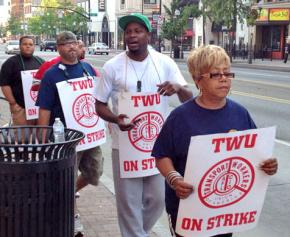Columbus bus drivers’ stand
Members of the Columbus ISO branch report on the struggle of the city's bus drivers and mechanics to win a contract that that doesn't contain concessions.
IN THE early hours of July 2, more than 600 bus operators and mechanics represented by the Transport Workers Union (TWU) Local 208 went on strike against the Central Ohio Transit Authority (COTA) in Columbus, Ohio.
When union leaders brought a revised deal to COTA later that day, the workers rejected the proposed agreement by 270-238 vote. Workers said they voted down the proposal because it didn't resolve the issue of advancement on the pay scale and because it would have cut benefits.
Picket lines continued throughout the city on July 3 as this article was being written--with Columbus officials scrambling to accommodate the tens of thousands expected to enter the downtown that night for the annual 4th of July celebration.
Local 208 sought a greater wage increase than the 2 and 2.5 percent increases over the next three years that COTA originally proposed in April. The union also sought revisions to the raise system in order to allow workers to reach the highest pay scale sooner--it currently takes seven years for drivers to reach that rate. The union also rejected a move that would force workers to pay 1 percent more into their pensions in 2013 and 2014.

In June, the union filed a notice of intent to strike beginning July 1 if demands for a fairer contract were not met. That night, just hours before the strike was set to begin, union representatives reached a tentative contract agreement with COTA management, but indicated that because COTA had not shown more urgency in reaching an agreement, the strike would proceed as planned.
THE STRIKE began just two days before an estimated 30,000 people were expected to pour into the downtown Columbus area via the bus system for the city's "Red, White, and Boom" July 4 celebration, an event for which COTA had previously ordered 200 extra buses. The strike also started just two days after near-tornado-force winds left 700,000 in the city without electricity. The power outages are not expected to be resolved until July 7, leaving many without air conditioning and at risk of suffering from heat-related illnesses as temperatures peak in the 90s.
Columbus Mayor Michael Coleman and COTA management pounced on the opportunity caused by the storm to blame workers for difficulties throughout the city--Coleman accused the workers of being "irresponsible" for striking at such a time.
However, the denunciations of city and state politicians, as well as COTA management, indicate just how important the COTA workers are to the city's day-to-day functions and the local economy. The Columbus Dispatch reported that COTA drivers provided 19 million trips to riders in 2011, indicating a huge upswing in bus use over the past year.
COTA CEO Curtis Stitt accused the union of leaving "thousands of people without transportation to their jobs, school, medical appointments and other destinations"--as though the burden of resolving the strike rested solely in the hands of workers, rather than with COTA management. In fact, COTA officials have only reluctantly been available for negotiations in recent months.
So when the strike deadline came, workers were ready. Beginning at 3 a.m., workers formed picket lines at three locations. Workers outside COTA headquarters in downtown Columbus marched, chanted and encouraged drivers to honk in support of their efforts throughout the day. The picketers often rotated between chants of "We don't want a strike--just treat us right!" and "Without us, there is no bus!"
The COTA strike comes on the heels of the defeat of Ohio Senate Bill 5, a state law nearly identical to the one that still stands in Wisconsin and heavily supported by Republican Gov. John Kasich, which would have made collective bargaining by state employees virtually impossible.
The law was overturned by Ohio voters in a ballot referendum last November in one of the few major victories that organized labor has seen throughout the U.S. since the economic crisis began.
According to WOSU, the local National Public Radio affiliate in Columbus, management's revised contract proposal didn't shorten the amount of time it took to reach the top of the pay scale, as the TWU had hoped. It reportedly did adjust the increments between workers, as well as offered workers a 7 percent pay raise over three years.
But that wasn't enough to win ratification of the deal. "It was the same contract with different colors--more pages, maybe; that's all," Mario Cuello, a COTA driver, told the Columbus Dispatch. "We work many hours. Eight hours can turn into 12. We're not making enough to pay our bills."
With that deal now rejected, workers are back on the picket line--and they need our support.


